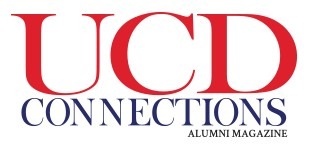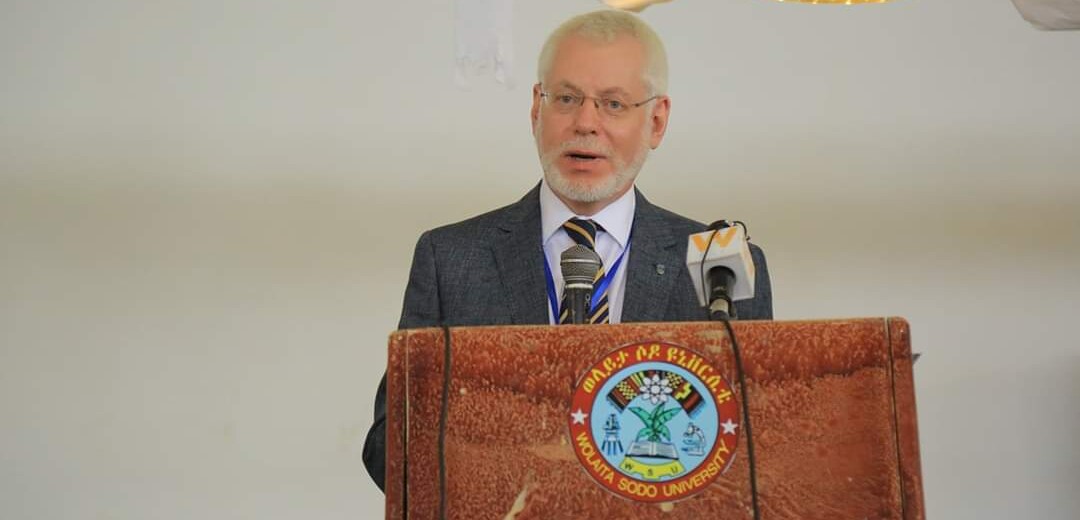Why UCD Engineering?
My very first introduction to UCD was in the 1960’s when my friends and I were just old enough to ride bicycles. We would cycle around Belfield, which at the time was just a patchwork quilt of fields, each field bounded by mature trees and hedges. I marvel at the foresight of President Tierney’s 1949 vision of acquiring the estates to form Europe’s largest
and most beautiful city-based university campus.
The Science Buildings were under construction back then but far from taking an interest in the civil engineering aspects of their construction (shame on me!) I favoured lazing on the sun-soaked grass banks that would later accommodate the UCD Engineering and Materials Science Building. Little did I know that even sunnier days awaited me as a UCD engineering
student and lecturer over the subsequent five decades.
Surprisingly quickly, school days were nearly over and it was time to think about university. My father Oscar, a UCD graduate of architecture, sadly shook his head and quietly confided to my mother “I’m afraid he just doesn’t have it to be an architect! Maybe a civil engineer?” I pretended to accept this sad fate with dignity, not wishing to let Dad know that it had never entered my head to be anything other than an engineer! It was also a ‘given’ in my mind that my studies would be in UCD. I had to eventually put my foot down when Oscar set up a career guidance meeting for me with Professor Wright, head of civil engineering in TCD. Not one to give a hostage to fortune I declined the meeting: Trinity for the Ball, UCD for everything else!
Tell us a bit about your student days at UCD…
I entered UCD as a student in the same year that Ireland took its place in the European Economic Community. A new confidence and fresh direction was emerging in Ireland’s global engagement. This would later see UCD engineering graduates chosen to front a campaign by the IDA across America: “The Irish: hire them before they hire you.”
Global engagement was becoming a two-way street after decades of one way traffic. Thus it was an exciting time to join ‘First Eng’ in 1973. Gender balance was not great: 148 males and one female, Orna Ní Chionna.
University life was not quite as expected: nine-to-five, Monday –to-Friday, back-to-back lectures and practicals! We deduced that the long contact hours was a cunning strategy by the authorities to keep the First Engineers out of mischief. Alas that master plan was unsuccessful. Somehow we found time to throw Orna into the Belfield lake. In true ‘First Eng’ spirit, Orna proceeded to pull into the icy February water anyone who extended a helping hand to pull her out! I was given a long-overdue opportunity to apologise to her in public 30 years later when I addressed the 2008 UCD Engineering Graduates Association Annual Lunch. It was the occasion at which she graciously accepted the EGA Distinguished Graduate Award in the O’Reilly Hall conservatory, overlooking the infamous lake. The EGA
award recognised our pride in her business leadership which was clearly shaped by her experience in UCD’s First Eng.
Meanwhile at First Year lectures the incomparable Professor Vincent McCabe was explaining that while 2 plus 2 equals 4, for an engineer 2 plus 2.0 did not equal 4.0. Suddenly we understood the engineering mind and burst with pride at our wise choice of profession.
From that moment on we entered the Belfield Bar on Friday nights to chat condescendingly with non-engineering students. These other students were not in on the secret that the world and its possibilities were infinite – infinite, that is, with a tolerance of plus or minus 5%, assuming that life had a statistically normal distribution!
My interest in global engagement was sparked by a final year study trip made by the civil engineering class to Moscow in 1977. We pierced the iron curtain in an Aeroflot Ilyushin IL62 at flight level 330. Below us, sparkling in the sunlight, were snow-covered USSR towns and villages that were strictly out-of-bounds to us. Our visas permitted us to stray no further than 35 km from Moscow’s Red Square. That restriction awakened in me an impatience with the artificial barriers to dialogue and mutual understanding that nation states both deliberately and inadvertently impose. Forty years later UCD attaches strategic priority to global engagement. One can reflect that this UCD strategic priority is needed even more in 2017 than it was in 1977, when Prof. Tom Casey led his UCD students around the cold war’s superpower exhibits ‘supreme economic achievement’.
How did you start working for Arup?
Graduation came around a little too quickly and I found myself catapulted into the exciting world of structural design with Arup consulting engineers.
Sir Ove Arup, the firm’s founder, was over 80 years old but still took time one afternoon to drop in to chat to us in the design office while I was on a short assignment in London. He shared with us the rules of his structural engineering firm. Rule #1: No matter how much the architect’s concept defied the laws of gravity; we were never to say “it cannot be done.”
Ingenuity was what engineers are paid for.
Rule #2 was that your life could only be fun if it made others happy as well. For me Rule #2 became an important yardstick in good times and bad.
Arup were (and still are) a wonderful company in respect of ‘win-win’ personal development and in 1981 I was loaned out part-time to do some lecturing at UCD. One of my earliest lectures were delivered to a First Engineering class that included Amanda Gibney. Amanda later joined the academic staff of UCD and she was presented with a national award for teaching by President Mary Mc Aleese. Presumably much of her success as a gifted educatorwas inspired by my brilliant treatise on the hyperbolic paraboloid when she was in ‘First Eng.’!
What was your return to UCD like?
My sojourn from Arup to UCD was supposed to be a short-term arrangement to facilitate my graduate studies but I discovered that UCD is actually Hotel California (“……you can check-out but ……….”). Not surprisingly therefore I ended up staying on for another six years before eventually formally parting company with industry to pursue an academic career.
Imagine my sense of awe working with my former lecturers, the greats of UCD Civil Engineering: Professors Casey, de Courcy, Dooge and Hanrahan. My greatest joy was learning the ropes first-hand from the lecturer that I had admired most in my undergraduate days, Aodh Dowley. His lectures were inspiring. He made it seem effortless.
Imagine my surprise when I found him lost in thought, staring out the window, having just stepped out of a lecture theatre. It was the year in which he would retire. He gazed at me and said “For the first time in my career I cannot say that I’ll do that lecture better next year!” Lord rest you Aodh, and thanks for teaching us how to think.
Memories of my wild first year days came to haunt me in 1991 when I was appointed by the Dean of Engineering, Prof. Vincent Dodd, to be the inaugural ‘Director of First Year Studies’.
My assignment was simple: civilise those wild First Engineers! Trapped in a ‘poacher turned game-keeper’ situation I set about the task. Vincent and I teamed up as an effective ‘good cop – bad cop’ combination and successfully turned the culture around over a period of
three years.
I learned a lot about my abilities and my limitations while working under Vincent’s mentorship. Like many others before me, I found personal inspiration in such iconic leaders which helps us to go the extra mile for UCD’s students.
Tell us about your journey through UCD…
I began to realise that the decades were slipping past rather quickly when my research challenge was flipped through 180. Carbon dioxide in the atmosphere is naturally absorbed by concrete but its penetration reduces the alkalinity of the material. This can lead to a risk of durability failure in reinforced concrete. Part of my research was therefore on minimising
the rate of atmospheric carbon dioxide penetration into concrete. It was a bit of a surprise when the global warming debate ultimately led the Irish concrete industry to seek research at UCD into maximising the rate of atmospheric carbon dioxide penetration into concrete. Time to re-engineer my thinking.
Meanwhile I was also taking an active interest in the development of the University through leadership roles including Head of Department (later Head of ‘School’). During one restructuring of academic units I led a joint school of architecture, landscape architecture and civil engineering for a 5 year period. My lecturing duties had long involved teaching structural theory and design to students of architecture, so I was no stranger to Richview. Imagine my pride in 2011 when my father’s name was among those of over 2,000 graduates commemorated in an art installation on the ceiling of Richview’s Red Room. I may not have studied architecture, Dad, but we were both privileged to be a part of the UCD architecture community in our respective ways.
My abiding interest in global engagement was noted by Prof Gerry Byrne, Dean of Engineering and Principal of the College of Engineering and Architecture. Gerry pushed an open door when he asked me to take on the role of Vice-Principal for Internationalisation in the College in 2013 when it became vacant. I took on the role with pleasure and later continued these duties until 2015 under the current College Principal, Prof David Fitzpatrick. The role involved a lot of opportunities to raise awareness overseas of UCD as a research-intensive world class university. My sense of pride in UCD, as Ireland’s Global University, was never stronger than at the conclusion of a meeting with staff of another university or after making a presentation to students in some distant corner of the globe.
What do you think lies ahead for future graduates of UCD?
We have a wonderful story to tell of UCD’s influence on national economic, cultural, political and technical development through the contribution of our graduates. Mindful of the immense responsibility on the staff of UCD to support the development of future leaders, we have now embarked on a strategy to develop a distinctive global culture which will encompass all aspects of university life. The future graduates of UCD must be equipped to influence international economic, cultural, political and technical developments.
In 2015 I took on the role of Deputy Vice-President for Global Engagement as my last major formal contribution to UCD’s development. Looking to the future I note the immense resource available to UCD as many of its graduates transition into an active ‘third act’ in life, anxious to share their talents and hard-won wisdom with their alma mater. Hopefully a chance for us to make a significant, if less formal, contribution to our great university.
And finally…Life as a UCD engineering student and academic?
inspiring + dynamic + community = a work still in progress.

